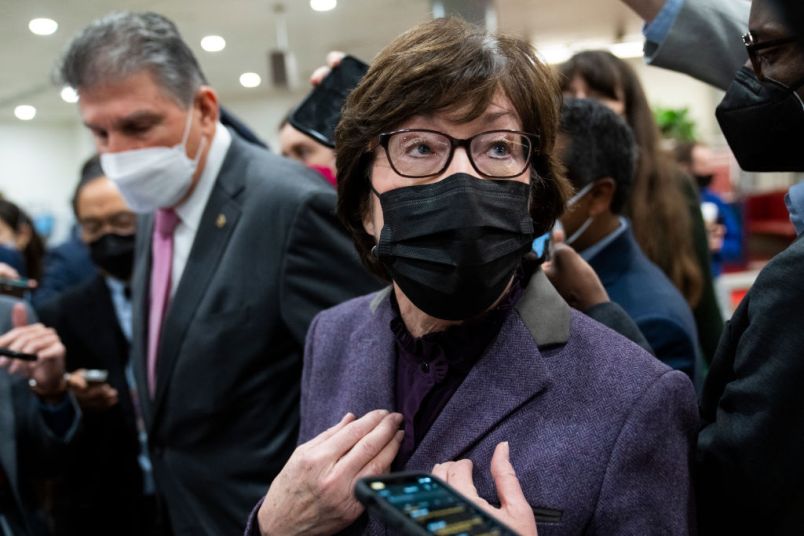A bipartisan group of senators met Monday evening to continue work on election reform legislation, a new rallying point after Sens. Joe Manchin (D-WV) and Kyrsten Sinema (D-AZ) voted down Democrats’ attempt to reform the filibuster and pass voting rights bills.
“Everyone is still very focused on producing a bipartisan bill that can garner 60 or more votes in the Senate,” Sen. Susan Collins (R-ME) said on her way out of the meeting. “That is our goal.”
Collins said that 16 senators were involved in the effort, but did not specify party breakdown. Whatever legislation these meetings produce will need at least 10 Republicans on board to survive the filibuster.
The group is breaking down into subsections to deal with specific issues, each headed by a Democratic and Republican co-chair.
Manchin read the areas of focus off a piece of paper on his way out of the meeting: clarifying the Electoral Count Act, protecting election workers and officials, voting practices and rights, the Election Assistance Commission and presidential transitions.
Collins and Manchin are chairing the group focused on devising a proposal to reform the Electoral Count Act. Collins said that they’d already met with the Senate parliamentarian to iron out details.
The group focused on protecting election workers and officials, Collins added, is looking at crafting federal penalties for threatening poll workers or other election officials. She said they were doing more research to figure out the interplay of federal and state laws.
The goal is to have a meeting Friday or over the weekend to assess the progress of the subgroups, according to various meeting participants.
While the legislation may represent more progress in the voting and election orbit than Democrats have managed by themselves, it will not be a forum to salvage prized pieces of the Freedom to Vote Act or John Lewis Voting Rights Act, the latter of which sought to repair the Voting Rights Act after it was gutted by the conservative Supreme Court.
“If we relitigate issues that have already been rejected by the Senate, then I think it would be very difficult for us to reach the 60 vote margin,” Collins said.
The persistent problem with crafting bipartisan legislation so far this term has been meeting the supermajority threshold imposed by the filibuster. While a few Republicans — Collins, Sens. Lisa Murkowski (R-AK), Mitt Romney (R-UT) — are often in the conversation, pulling together 10 of them has proved elusive. Six Republican senators joined the Democrats in voting to stand up a January 6 commission last spring, but it wasn’t enough. On their voting rights legislation in particular, Democrats only ever managed to potentially win over Murkowski on the John Lewis Act.
The success of this legislative effort may hinge on Senate Minority Leader Mitch McConnell’s (R-KY) willingness to give his members the green light. Collins on Monday characterized his attitude so far as “very open.”
The subgroups intend to meet throughout this week.
“We are moving aggressively,” Murkowski said.







Starting from scratch in order to waste enough time that nothing gets done. I hope they prove me wrong.
Is Manchin the only Democrat in this working group?
Maybe this will prove a triumph, but it’s mighty hard to feel like this isn’t an effort to fix the engines after the boat has sunk.
Snapping Turtle Mouth Open: Is It Normal? What You Should Do
That’s good